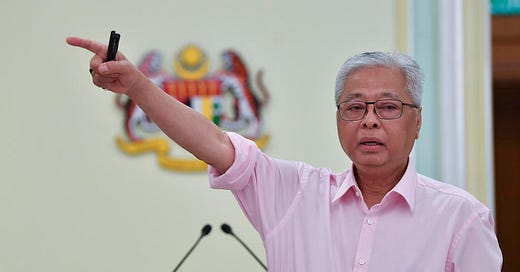Malaysia’s prime minister Ismail Sabri raises the level of xenophobia
Racism is holding Malaysia back
Malaysian prime minister Ismail Sabri Yaakob last week said that subsidies placed on chicken and other food items due to rapidly rising costs to assist people cope with inflation, are not intended for foreigners living in Malaysia. At the Malaysian Trades Union Congress 42nd triennial delegates’ conference on 2nd July, Ismail Sabri said that foreigners are unfairly enjoying the benefits paid for by Malaysian taxpayers.
Ismail Sabri was reported as saying “Bangladeshi workers and the Rohingyas (who) we often criticise also eat chickens and we are paying for the subsidies.”
Notwithstanding foreigners living in Malaysia are also tax and levy payers to the government, the prime minister’s statement indicates a xenophobic theme.
According to an Index Mundi Racial Discrimination survey, Malaysia is the second most racist country in the world, only topped by South Africa. Ironically, a United Malays National Organization (UMNO) vice president Mohamed Khalid Nordin, publicly declared that Malaysia must take a definite step to officially declare Israel as an apartheid state.
The 2010-14 World Values survey found the 59.7 percent of Malaysian respondents indicated they would not want immigrants or foreign workers as neighbours, one of the highest out of all the countries surveyed.
These are alarming statistics for a multiracial country that is totally dependent upon more than one million foreign workers to keep the economy operating.
Racism is a psychosis, a manifestation of deeply ingrained cultural assumptions that citizens of a nation largely share. Racism is manifested from internalised state of fear, anxiety, self-importance, persecutory complex, jealousy, envy, insecurity, feelings of inferiority, suspicion, and the feeling of being overwhelmed. Racism is a projection of undesirable emotion towards other ethnic groups, or cultures, as a defence mechanism as an attempt to control the environment. Racism is a tool for gaining power and/or dominance over others, or a tool where one society can rationalize being overwhelmed, out-performed, or envious of another society. As a cultural construct, racism defines the differences between different ‘tribes’, or communities.
Racism has become deeply embedded within the culture of Malaysian society through many dynamics.
Discrimination is primarily an institutional manifestation of racism where people of a defined ethnic group are denied what others are provided with, persecuted, or disadvantaged. The New Economic Policy (NEP) institutionalized discrimination. At the NEPs inception, the objective was positive discrimination to raise the equity of the Bumiputera community. However, after more than 50 years of the NEP, it has been little more than a smokescreen to enrich the elite who have been ruling the nation. The collateral damage has been the hatred the NEP has generated from the narratives leaders and politicians have used to justify it.
Hatred is based on the narcissistic traits of a culture. Hatred projects superiority, anger, arrogance, and ruddiness towards other groups to cover underlying fears or feelings of insecurity. A shared hate of another ethnic group can unite a community, and governments often utilize propaganda and indoctrination to create an external enemy for a community to jointly focus hatful sentiments upon.
This has caused division pitting ethnic group against ethnic group in society. The Chinese have been portrayed as the enemy, when the real enemy have been the robber barons.
Stereotyping resonates the differences of one group to another. Stereotyping is not based on hatred, but on different cultural ideologies, and mannerisms. There is both conscious and unconscious stereotyping undertaken within societies. Some stereotyping expressed through humour, becoming part of the culture.
Foreign guest workers are the victim of this stereotyping, which has turned into deep xenophobia.
Xenophobia, a deep fear of strangers, outsiders, and people of different ethnic groups, is a defence mechanism against uncertainty, feelings of being overwhelmed, or being out-performed. Xenophobia sometimes has the connotations of hatred, and can be a projection of emotions to cope with envy, uncertainty, or arrogance.
Racism, in its manifestations in Malaysia, has held back the economy, hindered the improvement of the standard of living, stifled creativity, contributed to community divisiveness, destroyed any semblance of meritocracy in the civil service, contributed to neo-feudalism, and kept the education system in mediocracy. Racism in Malaysia is deeply embedded within the institutions of governance, culture, and national narratives. Malaysia. A country once deemed as an “Asian Tiger”, has been quickly drifting into irrelevance.
Malaysia is very quickly deteriorating into a country where Malaysians will have to find work abroad to survive. The government is trying to block Malaysians working overseas, as was done with Australia’s ASEAN farm worker visa program. The deputy human resources minister Senator Awang Hashim would prefer Malaysians to work on local plantations in sub-standard conditions to enrich Malaysia’s GLCs. Malaysians who work abroad in other countries known for their xenophobia, may one day be able to empathise with Bangladeshi workers and the Rohingyas.
Systemic racism and xenophobia are Malaysia’s greatest weakness.
Subscribe Below:





Malaysia won't change unless the Bumis change and stop electing these clowns. They are reflective of the majority.
Change is long overdue. Wake more people up n vote for it b4 d country gets worst